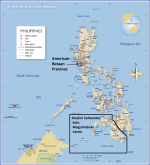raharris1973
Well-known member
If the US recognized the Philippine Republic's independence instead of annexing it, would another country have colonized it?
[Note - although the "if we don't, somebody else will, and they'll be worse than us" was part of the contemporary and retrospective justification for US annexation of the islands, I am not saying I accept as an excuse for violently occupying it against the will of its inhabitants or an excuse for any violations of the laws of war in so doing.]
Would a new, unestablished, non-white, poor, Asian-Pacific Republic without a modern Army or Navy have been too vulnerable to maintain sovereign independence in the early 1900s world of high imperialism over most of Africa, Asia, and Oceania?
Or would any of the following assets like the rebel leaderships background and experience from the independence struggle, their experience in international law and governance concepts gained from interactions with Spain and trading partners, or potential/probable residual interest from the United States have sufficed to help the Philippines remain independent?
By itself, does the existence, or not, of an American Philippines versus an independent Republic, effect the likelihood of an eventual Japanese mid-century Showa omnidirectional Western Pacific land and sea grab like we saw in OTL?
With independence instead of US colonization from the turn of the 20th century, would Filipino absolute GDP be higher or lower than OTL? Its per capita GDP? Its Gini coefficient lower or higher (with lower more equal and thus considered better)? Literacy? Life expectancy?
[Note - although the "if we don't, somebody else will, and they'll be worse than us" was part of the contemporary and retrospective justification for US annexation of the islands, I am not saying I accept as an excuse for violently occupying it against the will of its inhabitants or an excuse for any violations of the laws of war in so doing.]
Would a new, unestablished, non-white, poor, Asian-Pacific Republic without a modern Army or Navy have been too vulnerable to maintain sovereign independence in the early 1900s world of high imperialism over most of Africa, Asia, and Oceania?
Or would any of the following assets like the rebel leaderships background and experience from the independence struggle, their experience in international law and governance concepts gained from interactions with Spain and trading partners, or potential/probable residual interest from the United States have sufficed to help the Philippines remain independent?
By itself, does the existence, or not, of an American Philippines versus an independent Republic, effect the likelihood of an eventual Japanese mid-century Showa omnidirectional Western Pacific land and sea grab like we saw in OTL?
With independence instead of US colonization from the turn of the 20th century, would Filipino absolute GDP be higher or lower than OTL? Its per capita GDP? Its Gini coefficient lower or higher (with lower more equal and thus considered better)? Literacy? Life expectancy?
Last edited:


